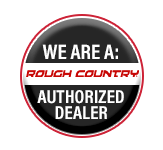FAQ
Have an industry-related question? We have the answer. Check out these FAQs and give us a call today for more information!
-
1. Do lift kits hurt your truck?
Any lift kit can damage the suspension or body if installed improperly. It alters the geometry of the suspension, which we at Daubs Garage set up after the installation with an alignment. The changes put stress on the vehicle as opposed to the vehicle's original manufactured structure. The performance, steering, handling will all be impacted. The improved off-road capability, style, and vision field is what people are after with a lift. Daubs Garage is a certified installer for a safe installation and guarantee.
-
2. Is a leveling kit or lift kit better?
Both leveling and lift kits are installed to raise the truck body away from the axles, to allow bigger tires and increase ground clearance.
Leveling kits are strictly for tire clearance. Usually when hauling or towing a heavy load to prevent sag is when you'd want to get a leveling kit. Manufacturers engineer trucks to be an inch or two taller in the rear than the front. The leveling hardware will slightly raise the front of the vehicle to match the stock height in the back.
The lift kit lifts the vehicle much higher and requires more time and effort to install. Basically a new suspension system is included in the kit to allow for an improved off-road experience and look.
-
3. What's the difference between a vehicle Body Lift and Suspension Lift?
A suspension lift is a better choice than a body lift in situations where off-road performance is the need. The suspension lift provides more room for larger tires and increases the ground clearance, allowing more freedom to raise your vehicle a few extra inches. Body lift usually is maxed out at 5 inches, whereas the suspension lift can go all the way up to 9 to 12 inches and truly transform the look and feel of your vehicl e.
You can tell the difference between the two lift kits by looking under the back frame, under the box or front cab mounts.
-
4. Do I need bigger wheels and tires for a leveling or lift kit?
The benefit would be the extra distance created between the vehicle's undercarriage and the ground, along with more traction. Some owners take lift kits too far; however, one of the most popular ground clearance mods is fitting bigger wheels.
Fitting larger wheels is a staple off-roading modification for a reason: larger tires do help a vehicle handle better on dirt and gravel, and even with on-pavement braking, can improve your truck's towing capability, can have a large impact on a vehicle's aesthetics, and with the large-diameter wheels and tires the vehicle looks lower, longer and wider.
-
5. Do I need a wheel alignment after getting a leveling kit, body or suspension kit?
Short answer, Yes!
The size doesn't matter in this case, or the kit being installed on all IFS 4X4s. All wheel angles in degrees, left and right side need to be aligned, while solid-axle 4X4s can typically get by with centering the steering wheel via a drag link adjustment. Some solid-axle 4X4s will also require caster adjustment for proper handling and road manners. A common cause of a shaking steering wheel after a lift kit and new rims and tires is the tires are out of balance. Even slight alignment issues can cause steering wheel shaking or vibrations. Here at Daubs Garage, we include the alignment with the lift installation.


Share On: